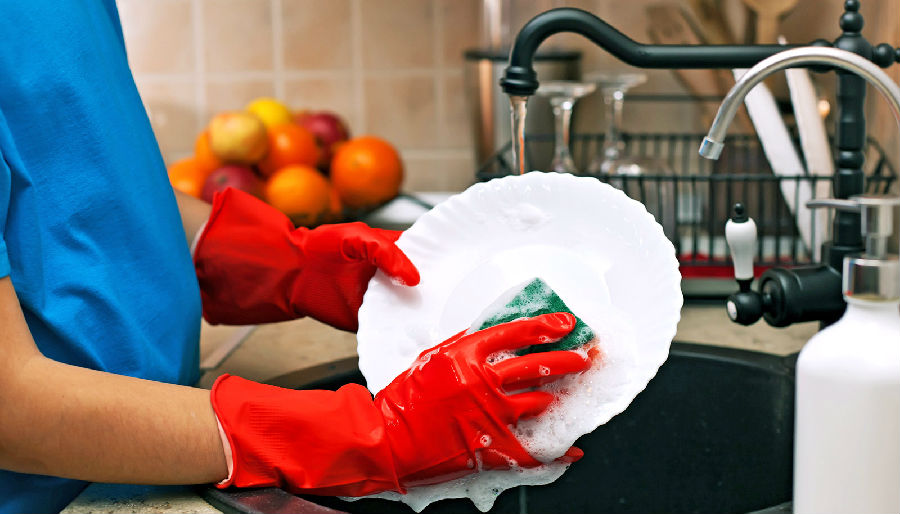Courses focus on developing life skills
勞動(dòng)教育納入高中必修課
Household chores like cooking and sewing always end up at the bottom of many of our to-do lists. Some people even think that they should be taken care of by our parents.
做飯和縫紉之類的家務(wù)活往往是最不需要我們操心的事。一些人甚至還認(rèn)為,父母照顧自己理所應(yīng)當(dāng)。
However, these life skills are important and should be taught as part of labor education. On June 3, the Ministry of Education (MOE) issued a document illustrating the revised curriculum for senior high schools across the country. According to the document, labor education is enlisted as a compulsory course for senior high school students at all levels.
但這些生活技能相當(dāng)重要,應(yīng)當(dāng)作為勞動(dòng)教育的一部分。6月3日,教育部發(fā)布文件,明確了全國(guó)普通高中課程的修訂方案。方案顯示,高中各年級(jí)應(yīng)將勞動(dòng)教育納入必修課。
Labor education, also called education on the hardworking spirit, ranges from household chores to on-campus labor and community volunteer services.
勞動(dòng)教育,也是吃苦耐勞精神的教育,包括了家務(wù)、校內(nèi)勞動(dòng)、社區(qū)志愿者服務(wù)等內(nèi)容。
"Labor education must be strengthened with the aim to cultivate the right view of the world, life and values and develop an interest in doing labor," said Vice-Minister of Education Zheng Fuzhi. Through such education, students are "expected to acquire basic working capabilities for livelihood and individual development, as well as form good working habits", said a guideline released by the MOE.
“加強(qiáng)勞動(dòng)教育,培養(yǎng)孩子們正確的世界觀、人生觀和價(jià)值觀,弘揚(yáng)勞動(dòng)精神,”教育部副部長(zhǎng)鄭富芝如此表示。通過(guò)這些教育,學(xué)生們能夠“具備滿足生存發(fā)展需要的基本勞動(dòng)能力,形成良好的勞動(dòng)習(xí)慣,”教育部發(fā)布的一份意見(jiàn)文件如此表示。

According to China Youth Daily, the labor course will take six credits – the same as foreign language and physics. Voluntary service, as a part of labor education, would take two credits. The MOE also asks schools to ensure 40 hours of voluntary service during the full three school years.
據(jù)《中國(guó)青年報(bào)》報(bào)道,勞動(dòng)課程共6學(xué)分——與外語(yǔ)、物理課程的學(xué)分相同。其中,志愿服務(wù)為2學(xué)分。教育部還要求學(xué)校確保三學(xué)年內(nèi)不少于40小時(shí)的志愿服務(wù)。
According to Xinhua, adding labor education was out of concern that the country's youngsters do too little housework and belittle manual labor jobs. Due to a lot of academic pressure, schools tend to focus on the academic curriculum, and parents sometimes see household chores as distractions.
據(jù)新華社報(bào)道,增加勞動(dòng)教育課程是由于我國(guó)一些青少年家務(wù)活干得太少,有輕視體力勞動(dòng)的現(xiàn)象。由于巨大的學(xué)業(yè)壓力,學(xué)校更為關(guān)注文化課,而家長(zhǎng)們有時(shí)也認(rèn)為干家務(wù)會(huì)分散精力。
According to People's Daily, a study from Beijing Academy of Educational Sciences showed that elementary and middle school students in China only spend 12 minutes a day on average on chores, compared to 72 minutes in the US, 42 minutes in South Korea and 30 minutes in France.
據(jù)《人民日?qǐng)?bào)》報(bào)道,北京教育科學(xué)研究院的一份研究表明,我國(guó)中小學(xué)生平均每天的勞動(dòng)時(shí)間只有12分鐘,而美國(guó)中小學(xué)生平均每天的勞動(dòng)時(shí)間為72分鐘,韓國(guó)42分鐘,法國(guó)30分鐘。
However, household chores for teenagers are by no means a distraction. Instead, they are essential for developing a strong work ethic, according to Julie Lythcott-Haims, the author of How to Raise an Adult. "The earlier you started, the better ... A roll-up-your-sleeves-and-pitch-in mindset can get you ahead in the workplace," Lythcott-Haims said. According to Northwest Educational Service, chores can also teach teamwork, problem-solving skills and give people a sense of pride in a job well done.
但做家務(wù)并不會(huì)令青少年分心。《怎樣養(yǎng)育一個(gè)成人》一書的作者朱莉·利斯科特-海姆斯認(rèn)為,做家務(wù)對(duì)于培養(yǎng)良好的職業(yè)道德至關(guān)重要。“越早開(kāi)始做家務(wù)越好……挽起袖子開(kāi)干的心態(tài)能讓你在職場(chǎng)上脫穎而出,”利斯科特-海姆斯表示。西北教育服務(wù)則認(rèn)為,做家務(wù)能培養(yǎng)團(tuán)隊(duì)合作精神、解決問(wèn)題的技巧,出色完成工作還能給人一種自豪感。












